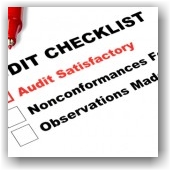Form I-9 Discrimination | CA University Medical Center Pays $115,000
Friday, January 6th, 2012 The Justice Department has reached a settlement agreement with University of California San Diego Medical Center for $115,000 (one of the higher civil penalties we’ve seen) for a complaint filed on Dec. 6, 2011, alleging that the medical center failed to comply with proper I-9 Form employment eligibility verification processes for non-citizens who are authorized to work in the United States.
The Justice Department has reached a settlement agreement with University of California San Diego Medical Center for $115,000 (one of the higher civil penalties we’ve seen) for a complaint filed on Dec. 6, 2011, alleging that the medical center failed to comply with proper I-9 Form employment eligibility verification processes for non-citizens who are authorized to work in the United States.
Specifically, the DOJ’s complaint alleged that UCSD medical center engaged in a pattern of subjecting newly hired non-U.S. citizens to excessive demands for documents issued by the Department of Homeland Security in order to verify their employment eligibility, but did not require the same of US citizens. The Immigration and Nationality Act’s (INA) anti-discrimination provision prohibits employers from placing unfair documentary burdens on work-authorized employees during the hiring and employment eligibility verification process based on their citizenship status or national origin. Clearly put, it is illegal to discriminate against work authorized individuals. You simply cannot specify which documents are to be presented. This is considered document abuse.
The medical center has taken appropriate action to ensure compliance with INA’s anti-discrimination provision and has received Department of Homeland Security/U.S. Immigration & Customs Enforcement (ICE) training on the proper use of work authorization documents. They have also agreed to work with the DOJ to ensure compliance with proper I-9 processes across all University of California campuses, medical centers and facilities.
Under the terms of the settlement agreement, the medical center agrees to implement new employment eligibility verification policies and procedures that treat all employees equally regardless of citizenship status. In addition, the medical center has agreed to pay a civil penalty of $115,000, conduct supplemental training of its human resources personnel on their responsibilities to avoid discrimination in the employment eligibility verification process and work with the department to ensure compliance with proper employment eligibility verification processes across all University of California campuses, medical centers and facilities.
Heightened Enforcement Continues
During the past few years, we have seen unprecedented enforcement and legislative activity relating to Form I-9 and E-Verify worksite compliance. Since fiscal year 2009, ICE has audited more than 6,000 employers, debarred 441 companies and individuals, and imposed more than $76 million in financial sanctions. We have also seen an unprecedented increase in the number of enforcement actions brought about by the Department of Justice (DOJ) for discrimination in the I-9 process. The Office of Special Counsel (OSC) has robustly prosecuted claims of discrimination in the I-9 process resulting in fines and penalties against employers, as well as back pay to injured parties.
What employers need to know
You just cannot presume that the employees charged with managing your I-9 program are compliant with the law and adhering to anti-discrimination rules and regulations. If you are not training your employees, then you are turning a blind eye to establishing a compliant workforce, the consequences of which today are severe and expensive – not to mention the bad press that accompanies such an investigation.
Employers cannot request specific documents (such as a green card), reject documents that reasonably appear to be genuine and relate to the employee presenting them, request that employees produce more documents than are required or treat groups of applicants differently when completing the I-9 form. You must examine ANY acceptable document from List A that appears to be genuine and that relates to the worker, or a combination List B plus a List C document, regardless of whether or not
Let’s re-visit ICE’s list of best practices that include the following as a reminder to employers:
- Use E-Verify,
- Use the Social Security Number Verification Service (SSNVS) for wage reporting purposes
- Establish a written hiring and employment eligibility verification policy.
- Establish an internal compliance and training program related to the hiring and employment verification process
- Require the I-9 process to be conducted only by individuals who have received appropriate training and include a secondary review as part of each employee’s verification to minimize the potential for a single individual to subvert the process.
- Arrange for annual I-9 audits by an external auditing firm or a trained employee not otherwise involved in theI-9 process.
- Establish a protocol for responding to letters or other information received from federal and state government agencies indicating that there is a discrepancy between the agency’s information and the information provided by the employer, such as SSA “No-Match” letters
- Establish and maintain appropriate policies, practices and safeguards to ensure that authorized workers are not treated differently with respect to hiring, firing, or recruitment or referral for a fee or during the Form I-9, E-Verify or SSNVS processes because of citizenship status or national origin.
- Maintain copies of any documents accepted as proof of identity and/or employment authorization for all new hires.
For more, refer to:
2) DOJ Press Release on one of the largest settlements against a major healthcare system
3) Our list of services and solutions
__________________
About Immigration Compliance Group
For those of you who may be first time readers, Immigration solutions provides US and Canadian business immigration services to employers and individuals and additionally provides a full range of I-9 employment eligibility compliance services for employers that require I-9 audits, training, and compliance policy development.

